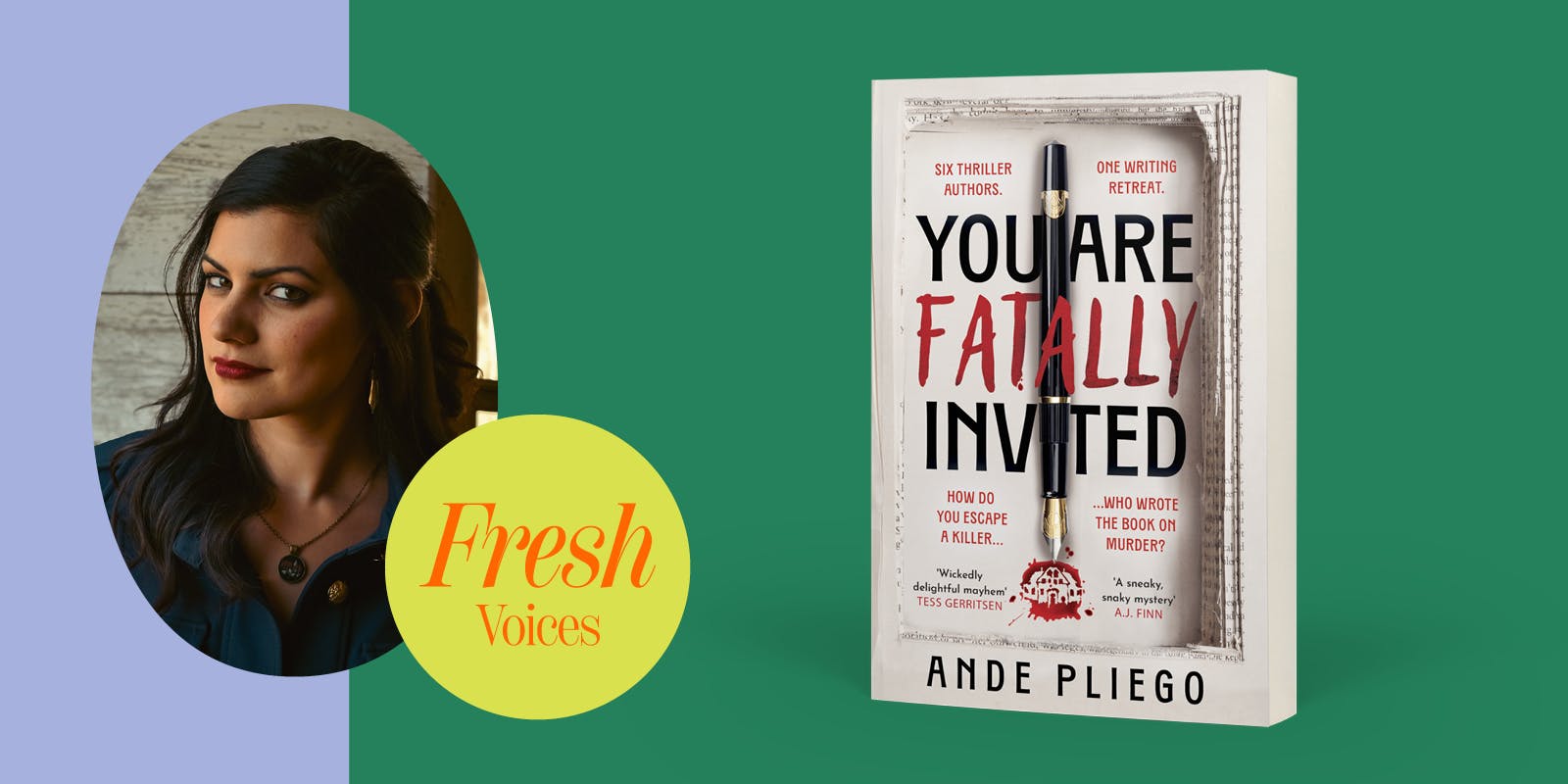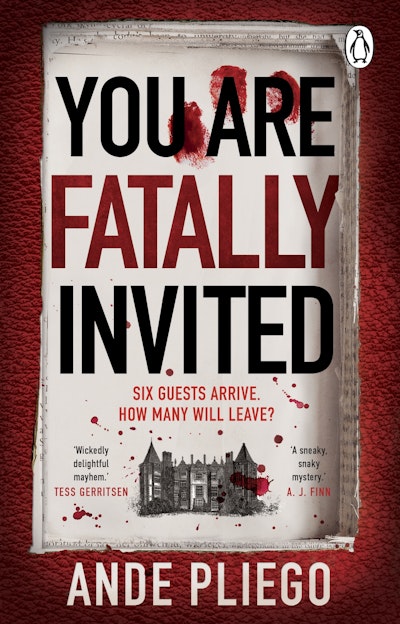Learn about the books that inspired her, which character she enjoyed writing most and the thing that surprised her about the publishing process.
Where did the idea for the book come from?
The premise for You Are Fatally Invited started out as two separate ideas I was eyeing: the first, a retelling of Agatha Christie’s And Then There Were None, but with thriller/horror authors on a writer’s retreat; the second, a locked room dinner party murder mystery, told from the perspective of ‘the inside man’ – the person who has the key, and is manipulating all the guests. The true magic sparked when it occurred to me that I could combine the two ideas into something fun and satirical. From there, I leaned into the meta element of the authors knowing all the famous tropes and having to survive the ones in their books – great fun.
Who was your favourite character to write?
Hands down, J.R. Alastor, who is the legendary anonymous thriller author hosting the retreat (and masterminding a murder, or two, or three, or . . . ). Throughout the book, we get snippets of Alastor’s own book on writing fear, and that’s the most we see of his voice on paper. Those snippets really spun out of me, the easiest thing I’ve ever written* – his dry, cheeky voice and dramatic turns of phrase were so much fun to let off the leash, and I loved making the chapters go from sinister to unhinged as the book goes on.
*We really don’t need to examine what that says about me, thanks.
What kind of research did you do for the book?
Oh, man – so much. I did a deep dive into luxury islands off the coast of Maine, and discovered a delightful one called Clapboard Island Estate, which I based Wolf Harbor Island on. I also researched all manner of thriller/horror/mystery tropes and movie props from pop culture and steeped my brain in Stephen King’s On Writing and his commentary on the horror genre, Danse Macabre.
An assortment of other random things that I found myself obsessively Googling: what damage happens to a house when it’s flooded from the top level (and alternatively, what makes a house explosion ruled as an accident vs. suspicious), literary lawyers, coast guard patrol patterns, water dragons in Chinese folklore, the mechanics of escape rooms, smart watches, boat houses, and my fabulous copyeditor went on a quest to discover whether wheelchairs actually float or not (fun fact: they do not).
Are there any books/authors/artworks that influenced you writing?
So many! My goal was to write And Then There Were None, by way of Grady Hendrix; his cheeky, satirical books are a huge influence on my writing, and this book especially. I also dissected books by Adrienne Young, Lucy Foley, and Ashley Winstead to study how they weave such complex, rich plots together into one incredibly satisfying mystery.
Marisha Pessl, Maggie Stiefvater, and Tana French have each had a huge influence on my prose; I’m constantly dissecting their words at the line-level and the way they spin dialogue and description. And I spent a lot of time with Riley Sager’s Home Before Dark and Marisha Pessl’s Night Film to see how they integrated all of their meta texts.
What’s your #1 tip for aspiring authors?
My mantra, which I will stand on a soapbox with a megaphone to announce, is that the only failed writer is the one who gave up.
Rejection is the name of the game; it’s a writer’s rite of passage, and it is not the definitive word on whether or not your work is good. Some of the best authors I know took years to get an agent, or years to sell a book, and their writing can run circles around mine any day of the week.
Get your work as good as you can get it, and then put yourself out there. When the rejection comes – because it will – let it sting and see if there’s anything to learn from it. Then pick yourself up and get back out there. You never know what’s around the corner*. And pop over to the For Writers page on my website for an alarming amount of writing/publishing talk from yours truly!
*The two times in my career I was closest to throwing in the towel was the week before I got my agent, and the week before You Are Fatally Invited sold in four countries. Whenever I remember how close I came, I have to recline on a sofa like an ailing Victorian woman. Life can change in a blink, but if you don’t stick it out, you will never know.
A fact or tid-bit you think might help readers understand your book better?
That this book is a satire! It’s playfully over-the-top on purpose.
Similar to how Galaxy Quest is about TV actors who find themselves in a ‘real life’ sci-fi story, and Jumanji has video-gamers dropped into a virtual game, so the thriller authors of You Are Fatally Invited find themselves trapped inside a real murder mystery and must escape a killer who plots murders as clever in reality as he does on the page.
My goal was to lean fully into the genre tropes, to make it fun and intentional – to write every trope and cliché with a meta-twist that would serve as a tongue-in-cheek nudge to the reader. This book is a love letter to the fear genres, poking fun at all the thriller/mystery/horror tropes that we all roll our eyes at (affectionately, of course); it only works because of the great and fun and wild locked-room mysteries that have come before it.
What surprised you most about the publishing process?
How long it takes to get published!
I’ve been trying to break into the book world since 2018; it’s a long game, and writers need to be prepared for that. Authors are not just out there winging a draft and sending it straight to the printers. Most books in bookstores were written years before their publication dates, mine included. You Are Fatally Invited had a relatively fast life from inception to shelf, and even that was two and a half years.
Additionally, every single traditionally published book out there – most of the ones you see on shelves – has gone through dozens of eyes before it’s printed. Trad published authors work extensively with editors who help them hone the book into its strongest incarnation, but then there are copyeditors, proofreaders, typesetters, etcetera, and that’s not even talking about the marketing and publicity departments, or sales representatives responsible for getting the book out there. It really does take an army to get a book into your hands.
What advice would you give to someone who’s currently working on their own debut novel?
Don’t worry about editing as you go, and dare I say it, don’t read what you’ve written as you’re drafting. It’s okay if later on you learn you’re an edit-as-you-go writer, but for the first book, I strongly recommend getting through your first draft to the end, at all costs.
Skeleton draft if you must, set a goal of two or three or six months if you need, but proving to yourself that you can write a book start to finish is the first step. You can fix anything in revisions – and figure out your best method of writing, too – but you need to know that you can finish a book in the first place!













